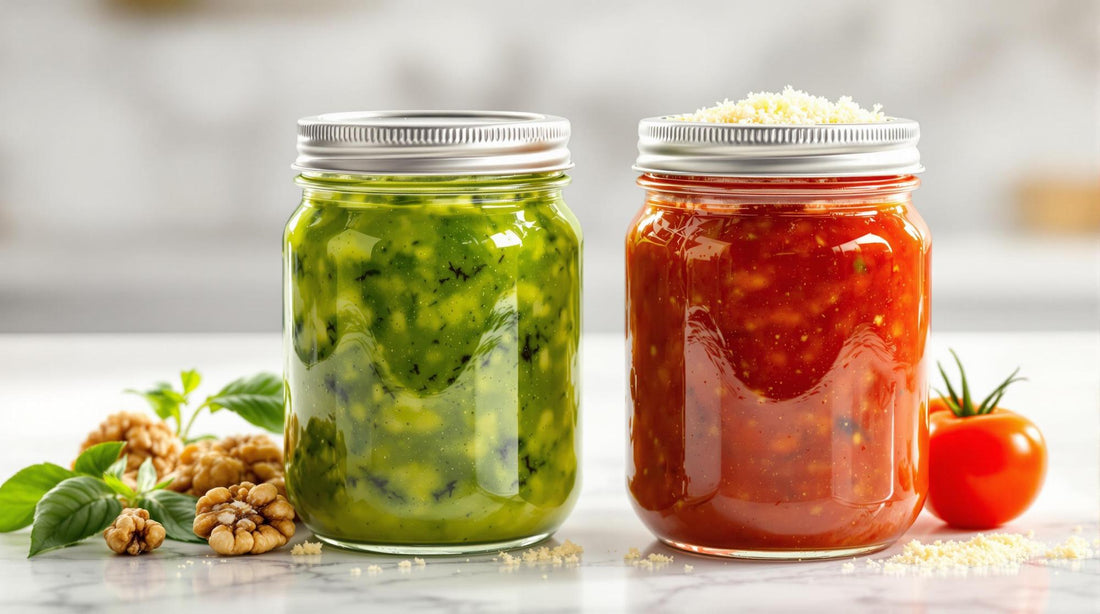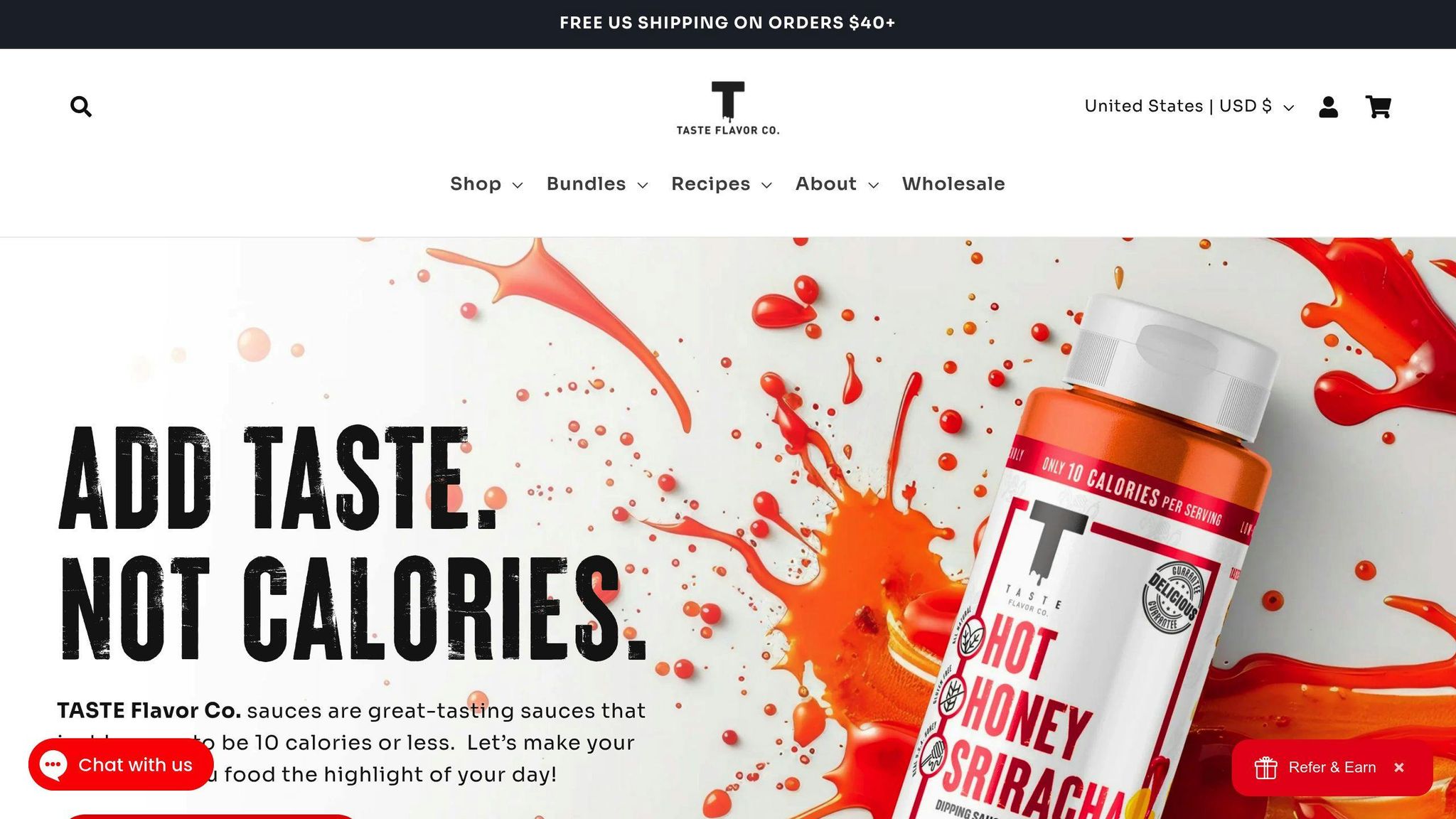
Vegan vs Regular Sauces: What's the Difference?
Share
Vegan and regular sauces differ mainly in their ingredients, nutrition, and dietary compatibility. Regular sauces often use animal products like dairy, eggs, or honey, while vegan sauces rely on plant-based alternatives such as cashews, soy milk, and nutritional yeast. Vegan options typically have fewer calories and no cholesterol, making them a healthier choice for many. They also cater to specific diets like gluten-free or keto, but may include allergens like nuts or soy. Here's a quick comparison:
| Aspect | Regular Sauces | Vegan Sauces |
|---|---|---|
| Base Ingredients | Dairy, eggs, honey, anchovies | Cashews, soy milk, nutritional yeast |
| Calories | Higher due to animal fats | Lower, no cholesterol |
| Dietary Needs | May contain allergens like dairy | May contain nuts, soy; often gluten-free |
| Environmental Impact | Higher carbon footprint | More eco-friendly |
Vegan sauces replicate traditional flavors using substitutes like tahini, miso, and maple syrup. Whether you're vegan or exploring plant-based options, these sauces offer flavorful and ethical alternatives.
Main Ingredient Differences
Traditional sauces often use animal-based ingredients as their foundation. Creamy sauces typically include dairy products like cream, butter, or milk, while mayonnaise relies on eggs as an emulsifier. Some animal-derived components are less obvious - Worcestershire sauce, for example, often contains anchovies, and certain BBQ sauces use honey for sweetness.
Vegan Sauce Base Ingredients
Vegan sauces recreate the flavors and textures of traditional recipes with plant-based substitutes. Instead of dairy, ingredients like cashews, soy milk, and plant oils are used to create creamy textures. Maple syrup often takes the place of honey, while nutritional yeast provides the savory, cheese-like flavor usually associated with dairy.
Side-by-Side Ingredient List
Here’s a comparison of ingredients for popular sauce types:
| Sauce Type | Regular Ingredients | Vegan Ingredients |
|---|---|---|
| Mayonnaise | Eggs, oil, vinegar, salt | Soy milk, oil, vinegar, salt |
| Alfredo | Heavy cream, butter, parmesan cheese | Cashews, nutritional yeast, plant milk, garlic |
| BBQ Sauce | Tomato base, Worcestershire sauce (anchovies), honey | Tomato base, tamari, maple syrup |
| Bechamel | Butter, cow's milk, flour | Vegan butter, plant milk, flour |
"The need for clear labeling and transparency about ingredients and manufacturing processes is crucial to help vegan consumers make informed choices. This includes disclosing any potential cross-contamination with animal products"
When shopping for vegan sauces, check for certifications like Vegan Society or PETA-approved labels. Be cautious of additives - some may contain hidden animal-derived components or be tested on animals. For example, certain dark soy sauces might use caramel made with refined sugar processed with bone char. Tamari is a great alternative, offering a richer flavor and being fully vegan.
These ingredient swaps not only influence taste but also change the nutritional profile of the sauces.
Nutrition Facts Compared
Calories and Main Nutrients
Vegan sauces typically have fewer calories than their traditional counterparts, mainly because they lack animal fats. For instance, a tablespoon of vegan mayonnaise contains about 10 grams of fat, compared to 12 grams in traditional mayonnaise, which includes egg yolks.
| Sauce Type | Regular (per tbsp) | Vegan (per tbsp) | Key Difference |
|---|---|---|---|
| Mayonnaise | 12g fat, 110 cal | 10g fat, 90 cal | - |
| Teriyaki | 2g protein, 20 cal | 1g protein, 15 cal | Less protein |
| Alfredo | 15g fat, 120 cal | 8g fat, 80 cal | - |
Aside from calories and macronutrients, the levels of vitamins and minerals can differ significantly between vegan and regular sauces.
Vitamin and Mineral Content
Vegan sauces often include ingredients like cashews and nutritional yeast, which are rich in antioxidants and minerals. On the other hand, regular sauces may contain vitamin D from dairy.
"Plant-based sauces can deliver comparable or superior nutritional benefits while eliminating cholesterol and reducing saturated fat intake"
These variations in nutrients also play a role in the overall health effects of your sauce choices.
Health Impact and Risks
The nutritional differences between vegan and traditional sauces influence their broader health effects. Research from the Journal of the American Heart Association shows that incorporating more plant-based foods, including sauces, is linked to a 16% lower risk of cardiovascular disease.
- Traditional sauces may carry health risks due to high sodium levels or allergenic ingredients like dairy and eggs.
- Some vegan alternatives include added sugars, which can affect health goals.
- Vegan white sauces made with unsweetened almond or oat milk cut down on saturated fat while keeping their creamy texture. Nutritional yeast, often used in these sauces, is a good source of B-vitamins and protein, making it a strong replacement for cheese-based options.
sbb-itb-f97e3b5
Taste and Texture Analysis
What Affects Taste and Feel
Traditional sauces often get their rich taste and smooth texture from ingredients like cream, eggs, and butter. Vegan sauces, on the other hand, rely on plant-based options such as cashews and miso paste to deliver similar results.
Fermentation is a game-changer here. Ingredients like miso paste and tamari add a deep umami flavor, while items like tahini and blended nuts help replicate the creamy texture usually provided by dairy. By carefully selecting these substitutes, vegan sauces can come surprisingly close to the flavors and textures of their traditional counterparts.
Making Vegan Sauces Taste Similar
To mimic the flavors of traditional sauces, food scientists combine plant-based ingredients in clever ways. For example, nutritional yeast brings a cheesy, nutty flavor to the table, while seaweed adds a hint of the ocean, much like fish-based components.
Fermentation also plays a big role. Techniques similar to those used for soy sauce help develop complex, layered flavors in vegan alternatives.
"Plant-based ingredients and fermentation processes can create complex flavors and textures that rival traditional sauce profiles"
Direct Taste Test Results
Take a vegan Bolognese sauce, for instance. A mix of lentils and mushrooms can replicate the hearty texture and umami notes that meat typically provides. Vegan white sauces, while slightly different in mouthfeel due to the lack of dairy fats, achieve a close match by incorporating tahini or blended nuts.
These findings are incredibly useful for both home cooks and food manufacturers. For example, adding a touch of miso paste to vegan cream sauces can deliver the savory depth often missing without dairy. Such tweaks cater to the increasing demand for ethical and health-conscious food choices while still delivering on flavor.
These advancements show how vegan sauces can fit a wide range of dietary needs without losing out on taste or texture.
Diet and Ethics Guide
Diet Plan Compatibility
For those on a keto diet, cream-based sauces can be a good option, but it's important to check for hidden sugars. Vegan sauces made with plant-based oils and no added sugars can also fit keto needs. Gluten-free eaters should watch out for wheat-based thickeners or potential cross-contamination. A great alternative to traditional soy sauce is tamari, which offers a gluten-free option with a bolder flavor.
| Diet Type | Regular Sauce Considerations | Vegan Sauce Options |
|---|---|---|
| Keto | Cream-based sauces, check carbs | Oil-based, sugar-free options |
| Gluten-Free | Check for wheat thickeners | Tamari, certified gluten-free |
| Low-Carb | Avoid added sugars | Nut-based alternatives |
| Paleo | Skip processed ingredients | Cold-pressed oil versions |
Food Allergy Guide
Sauces, whether regular or vegan, often include common allergens. Regular sauces may contain dairy, eggs, or even shellfish, while vegan options frequently rely on nuts or soy. Brands like Taste Flavor Co address these concerns by offering clearly labeled allergen-free choices, such as their Spicy Garlic Parm sauce, which is both vegan and allergen-friendly.
"The growing demand for vegan products, including sauces, indicates a shift towards more ethical and sustainable food choices. The vegan sauces, dressings, and spreads market is expanding due to increased consumer interest in plant-based options"
When shopping, keep an eye out for:
- Bold allergen warnings
- "Made in a facility" disclaimers
- Certification symbols
- Ingredient lists written clearly
Choosing the right sauce isn't just about personal health - it's also tied to environmental and ethical considerations.
Impact on Planet and Animals
The environmental effect of sauce production can vary widely. Traditional sauces, especially those made with animal products, tend to have a larger carbon footprint. Vegan alternatives, on the other hand, generally require fewer resources and align better with eco-friendly practices.
Switching to vegan sauces can make a big difference. For example, Taste Flavor Co uses sustainable ingredients in their products while still delivering bold flavors. Their Cherry Smoked BBQ sauce is a great example - it provides rich, smoky taste without relying on animal-based ingredients, proving that ethical choices don’t have to sacrifice quality.
Final Tips and Product Guide
Let’s break down the key differences in sauces and share practical advice for picking the best option for your needs.
Main Differences Overview
Vegan sauces swap out animal-based ingredients like cream or eggs for plant-based options such as nuts, seeds, or natural thickeners. Soy sauces, typically made from soybeans, wheat, salt, and water, are often vegan. However, watch out for non-vegan additives like caramel coloring processed with bone char.
| Aspect | Regular Sauces | Vegan Sauces |
|---|---|---|
| Base Ingredients | Animal products, dairy, eggs | Plants, nuts, seeds |
| Certification | Standard food labels | Vegan certification helpful |
Tips for Choosing the Right Sauce
- Read Labels Carefully: Look for hidden animal products or allergens. Many common sauces like A1 Steak Sauce, barbecue sauce, and salsa are naturally vegan.
- Health Considerations: Choose vegan options with no added sugars or oils if you're aiming for healthier choices.
- Certifications Matter: For stricter diets, check for vegan certifications to avoid hidden animal-derived ingredients.
Nutritional Perks: Vegan sauces typically offer similar nutritional benefits to traditional sauces but without cholesterol from animal fats.
Taste Flavor Co Options

For those craving flavorful yet health-conscious sauces, brands like Taste Flavor Co deliver options that cater to a variety of dietary needs. Their gluten-free, keto-friendly offerings like Cherry Smoked BBQ and Hot Honey Sriracha are made with real ingredients, free from oils and preservatives. These sauces prove you don’t have to sacrifice taste to meet dietary preferences.
